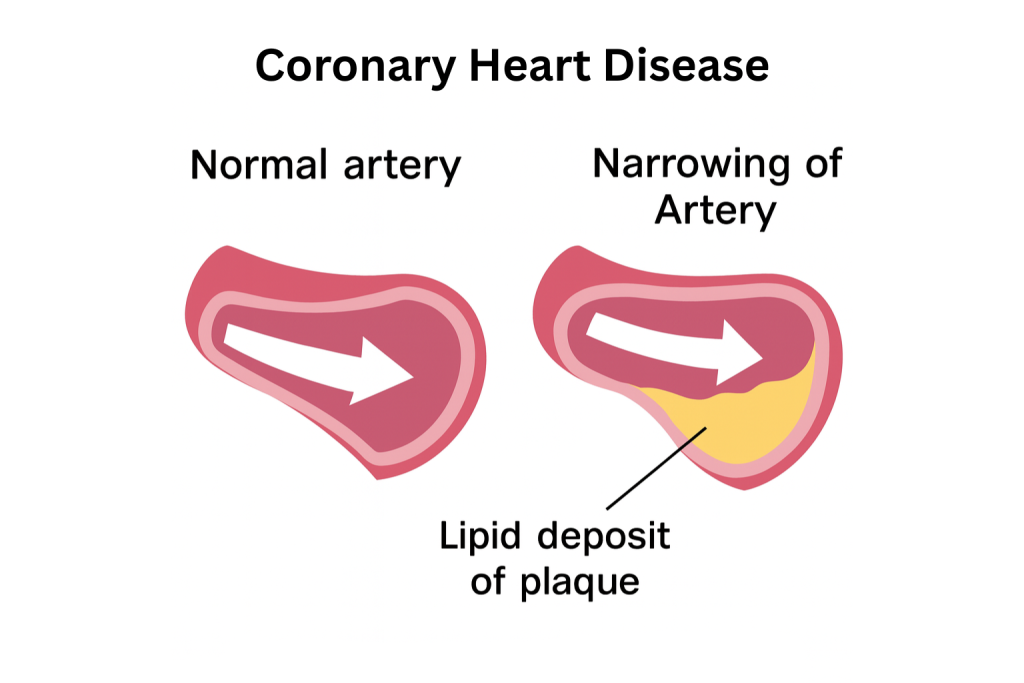Heart failure is a condition where the heart is not able to pump blood around the body as well as it should.
Despite the name, it does not mean the heart has stopped working. Instead, it means the heart is weaker or stiffer than normal, so blood does not flow as effectively. This can cause tiredness, breathlessness, and fluid build-up in the body.
Heart failure is common, especially in older adults, and it can develop gradually over time. With the right treatment and lifestyle changes, many people with heart failure can live active lives for many years.
Heart failure is usually the result of other conditions that have damaged or weakened the heart. The most common causes include coronary heart disease, where the arteries supplying the heart become narrowed, and heart attacks, which can damage heart muscle.
Other causes include high blood pressure, which makes the heart work harder, and conditions that affect the heart valves or rhythm. Sometimes heart failure is linked to infections, thyroid problems, or genetic conditions. In some cases, doctors cannot find a single cause.

The symptoms of heart failure can vary, but the most common ones are breathlessness, tiredness, and swelling in the ankles, legs, or stomach. Some people find it hard to breathe when lying flat or wake up at night short of breath. Others may feel more tired than usual, even when doing simple activities.
As the condition progresses, symptoms may become more noticeable and affect everyday life.

Doctors use a combination of symptoms, examination, and tests to diagnose heart failure. A GP may listen to the chest, check for fluid build-up, and ask about medical history. Blood tests can show if the heart is under strain, while an electrocardiogram (ECG) can record the heart’s electrical activity.
Imaging tests such as echocardiograms, chest X-rays, , or MRI scans can give detailed pictures of the heart’s structure and function. These tests help doctors confirm the diagnosis and decide on the best treatment.
Yes, heart failure can affect different parts of the heart. Left-sided heart failure happens when the left side of the heart is not pumping strongly enough. Right-sided heart failure means the right side is struggling, often because the left side is already weak.
Doctors may also describe heart failure based on whether the heart muscle is too weak to squeeze properly or too stiff to relax and fill with blood. These types are called reduced ejection fraction and preserved ejection fraction.
No, they are different. A heart attack happens suddenly when a blood clot blocks an artery to the heart. This causes damage to the heart muscle. Heart failure, on the other hand, is usually a long-term condition that develops over time, often as a result of heart attacks, high blood pressure, or other heart problems.
However, a heart attack can lead to heart failure if the damage is severe enough.
Although heart failure cannot usually be cured, it can be managed effectively. Treatment often involves medicines to help the heart work better, reduce symptoms, and prevent the condition from getting worse. Common medicines include ACE inhibitors, beta-blockers, diuretics, and mineralocorticoid receptor antagonists.
In some cases, devices such as pacemakers or defibrillators are fitted to help control the heartbeat. Severe cases may require surgery, such as valve repair or, in rare cases, a heart transplant.
Lifestyle changes are also very important. Eating a healthy diet, reducing salt intake, staying active, avoiding smoking, and limiting alcohol can all improve heart health.
Without treatment, heart failure usually gets worse over time. Symptoms such as breathlessness and fatigue can become more severe, and the risk of hospital admissions increases. Untreated heart failure can also shorten life expectancy.
This is why it is important to seek medical advice if you notice symptoms, as treatment can greatly improve both quality of life and survival.
Heart failure is more common in older people, but anyone can develop it. Risk increases if you have had a heart attack, have high blood pressure, or live with conditions like diabetes, obesity, or long-term kidney disease. Family history also plays a role, and men are slightly more likely than women to develop it.
Lifestyle factors such as smoking, lack of exercise, and a poor diet can also increase the risk.
Not all cases can be prevented, but many risk factors can be managed. Keeping blood pressure and cholesterol under control, eating well, exercising regularly, and not smoking are key steps. Regular health checks can also spot problems early, reducing the chance of developing heart failure later on.
If you already have heart disease, following your treatment plan carefully can lower your risk of developing heart failure.
Life with heart failure can be challenging, but with treatment and support many people manage it well. Symptoms may limit what you can do, but cardiac rehabilitation programmes, lifestyle advice, and medicines all help.
Emotional health is also important, as living with a long-term condition can cause stress or anxiety. Support from family, friends, and healthcare teams makes a big difference. Many people find that once they understand their condition and know how to manage symptoms, they feel more in control and able to live a fulfilling life.
Heart failure is a condition where the heart does not pump blood as effectively as it should. It is usually caused by other heart problems such as coronary heart disease, heart attacks, or high blood pressure. The main symptoms are breathlessness, tiredness, and swelling in the body.
Although it cannot usually be cured, heart failure can be managed with medicines, lifestyle changes, and sometimes medical devices or surgery. Early diagnosis and treatment are vital to improve quality of life and reduce risks. By looking after your heart health and managing risk factors, it is possible to live well with heart failure.
Disclaimer: Seonat provides general health information for educational purposes only. This content is not a substitute for professional medical advice, diagnosis, or treatment. Always seek the advice of your GP or another qualified health provider with any questions about a medical condition or before making health decisions.

Simplifying health information for those who need it most
Please note: we are not medical professionals, and the content on this website is for general information only. Always speak to a qualified healthcare provider for medical advice.